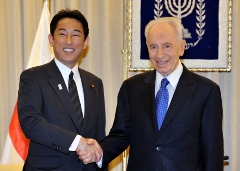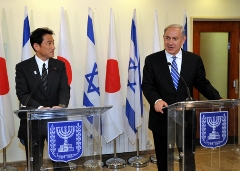Countries & Regions
Visit to Middle East by Foreign Minister Kishida (Israel and Palestine, July 24)




During his visit to the Middle East, Fumio Kishida, Minister for Foreign Affairs of Japan, conferred with leaders from Israel and Palestine on Wednesday, July 24. An overview of the talks is as follows:
Major Events
Israel: Courtesy call on President Shimon Peres, separate talks with Justice Minister Tzipi Livni (in charge of peace process with Palestine) and Regional Cooperation Minister Silvan Shalom, visit to the Yad Vashem (the Holocaust Memorial Museum) and conference with Prime Minister and Foreign Minister Benjamin Netanyahu (morning and afternoon of July 24, all in Jerusalem).
Palestine: Conference with Foreign Minister Riyad al-Maliki, courtesy call on President Mahmoud Abbas, exchange of notes on Japan's provision of Non-Project Grant Aid and iftar (meal after fasting) dinner with President Abbas (evening of July 24, all in Ramallah).
Overview
(1) Israel
A. Bilateral Relations
Japan and Israel agreed to further strengthen their bilateral relations. In particular, they agreed to reinforce the framework of dialogue between the two countries, including in the fields of public relations, security and international law as well as between experts in the field of space, and to promote cooperation in science and technology, in which both countries are advanced.
Minister Kishida invited Prime Minister Netanyahu to visit Japan. Prime Minister Netanyahu showed strong eagerness to do this and invited Prime Minister Shinzo Abe to visit Israel.
B. Middle East Peace
Minister Kishida asked the Israeli leaders to conduct sincere dialogue and negotiations with Palestinians, noting positive moves toward Middle East peace since the previous week, brought by the efforts of the U.S., particularly those of Secretary of State John Kerry. He also said that achieving peace would be the cornerstone of stability in the region. Resuming negotiations is just a starting point, Minister Kishida said, adding that Japan will help make the negotiations successful both in political and economic ways, by promoting its efforts such as the "Corridor for Peace and Prosperity" initiative and the Conference on Cooperation among East Asian Countries for Palestinian Development (CEAPAD). It also plans to double the number of people invited to Japan under the Joint Invitation Program for Israeli and Palestinian Young Leaders, he said. Minister Kishida told the Israeli leaders that he would convey the same message directly to the Palestinian side as well. Minister Kishida also urged the Israeli leaders to avoid spoiling the positive atmosphere, particularly to stop settlement construction.
Prime Minister Netanyahu and other Israeli leaders said they greatly appreciate Japan's contribution toward Middle East peace, including the Corridor for Peace and Prosperity initiative. With the resumption of negotiations close, brought by the efforts of U.S. Secretary of State Kerry, they said Israel should not miss this opportunity and is willing to sincerely negotiate to achieve peace. In particular, Prime Minister Netanyahu noted the importance of continuing peace efforts in order not to let the framework collapse. He said that there are various problems but Israel hopes to solve these through the negotiations.
(They also exchanged views on the Iranian nuclear issue, and agreed to promote bilateral dialogue on such regional issues.)
(2) Palestine
A. Middle East Peace
President Abbas said Palestine will proceed with peace negotiations seriously once they resume. He said he has a positive outlook on the negotiations. The president reiterated his deep gratitude to Japan for its support for the United Nations General Assembly resolution to accord to Palestine non-member observer State status in the autumn of 2012.
Minister Kishida said he welcomes signs of the resumption of peace negotiations and expressed hopes that the two sides will promote sincere dialogue and negotiations. He said, however, that resumption of negotiations is just a starting point and both parties need to make efforts to achieve success. He added that Japan is ready to provide support both in political and economic ways. Touching on the Ministerial-Level Meeting of the Four-Party Consultative Unit for the Corridor for Peace and Prosperity initiative planned for the following day in Jericho, Minister Kishida said the Agro-Industrial Park will contribute to fostering an environment for a future two-state solution. He urged President Abbas to avoid spoiling the current positive momentum and environment for peace negotiations by taking steps on Palestine's membership in international organizations.
B. Assistance to Palestine
Minister Kishida explained that, in addition to doubling the number of people invited to Japan under the Joint Invitation Program for Israeli and Palestinian Young Leaders, Tokyo has provided 4.1 billion yen of assistance to Palestine since he took office, including the Non-Project Grant Aid of 800 million yen on which notes were exchanged on the occasion of his visit. He also said Japan is ready to give further assistance in other fields. He also explained Japan's efforts on CEAPAD, including its future schedule.
President Abbas repeatedly expressed his gratitude for Japan's assistance to Palestine, including the Corridor for Peace and Prosperity initiative and CEAPAD. He also described as very timely Japanese assistance through the United Nations Relief and Works Agency (UNRWA) to Palestinian refugees facing difficulties in Syria.
(END)


